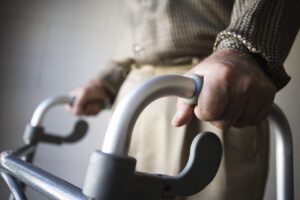 Watching your loved one age can be difficult. When you are visiting, you have a chance to see how they are doing regarding health, safety, and quality of life and you may start to see signs that they need help. If you are trying to decide if your loved one needs in-home care, these signs will help you make that decision.
Watching your loved one age can be difficult. When you are visiting, you have a chance to see how they are doing regarding health, safety, and quality of life and you may start to see signs that they need help. If you are trying to decide if your loved one needs in-home care, these signs will help you make that decision.
Household Signs
AARP.org suggests that if you see the following issues in your loved one’s home, it could be a sign they are unable to handle their daily affairs.
- Stacks of unopened bills and unpaid bills
- Increased clutter
- Spoiled food
- Unwashed dishes
- Burned pots and pans
Personal Care Signs
Personal care is often one of the first signs your aging loved one is having difficulty in completing tasks that were once routine.
- Laundry is not being done
- Clothes not being changed
- Poor hygiene
- Wearing night clothes all day
- Body odor and bad breath
Emotional Well Being Signs
Changes in personality or behavior could have many causes, but it could be a sign that your loved one is having difficulty managing. It could even be that they are afraid to ask for help.
- Defensive or angry disposition
- Neighbors expressing concern
- Not making trips outside the home nearly as often
- Isolating themselves
- Complaining that you never visit when in fact you were just there
Physical Well Being Signs
You may need to pay close attention to these areas since they are more easily hidden. Your loved one may be embarrassed to discuss these things with you as well.
- Unexplained cuts and bruises
- Dents/dings on the car
- Failure to maintain their vehicle.
- Missed doctor appointments
- Forgetting to take medications
If you aren’t sure what level of care your loved one may need, please see our blog “Differences Between Levels of In-home Care” and remember that if you notice these signs, it’s important for you, as the son or daughter, to pay close attention and to initiate a conversation with them. They have been independent for most of their lives and may not open up to you right away. So, approach them respectfully, and listen more than you talk.
A caregiver is a very helpful asset for seniors who need help around the house or reminders for medications. If you are still unsure if your loved one would benefit from home care, please contact us to discuss your case in greater detail.

